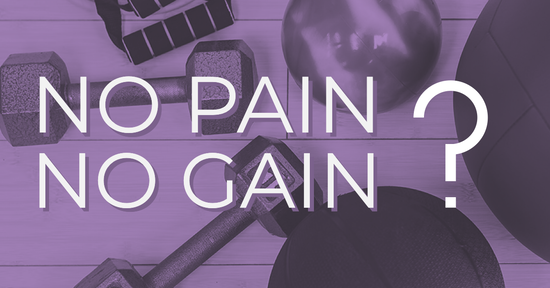|
In the previous post, I covered a couple of common fitness beliefs that could potentially impact how one feels about exercise and what constitutes an effective workout. Let's talk about a couple of others and see where they stand. Go for the Burn "If it doesn't hurt, you aren't working hard enough!" It is true that to obtain many of the positive physical changes associated with exercise, you must create enough stimulus for your body to adapt. This usually means challenging yourself by going beyond what is relatively easy and/or comfortable. Working towards muscular fatigue and/or “the burn” is sometimes a part of that. Is feeling the burn an accurate measure of an effective session? Not necessarily. What you do for exercise is dependent upon your goals and preferences and how you feel during your sessions can be influenced by genetics, your fitness level, and other factors. Let’s start with what causes the muscle burning sensation. As you exercise, (let's say, lift weights) your muscles require energy. Initially, this process uses oxygen. If your push past a certain point, you will use up all the available oxygen in the cells which causes a change in the way required energy is created. By-products of the anaerobic process build up creating an acidic environment; you feel that “burning” sensation and your muscles fatigue. This usually happens when performing higher repetitions or higher intensity exercise. It’s not necessarily a bad thing. In some cases, it lets you know that you are working at a sufficiently intense level, and if your goal is muscle hypertrophy (growth) and/or endurance, you likely need to reach this point during your training sessions. It is thought that metabolic by-products play a role in those desired muscular changes. However, if you are working to build pure strength, you generally won’t be working at this higher rep range very often (strength gain protocols typically call for higher weight and lower reps) and therefore, the sensations felt during your lifts will be different. Some people are better at clearing the by-products (it’s a genetic thing) and thus may not “burn” as quickly or as much as someone else performing the same exercise. Age and diet can also play a role. And if you continue training in those higher rep ranges, your cells will get more adept at dealing with the cellular environment created while training. You will be able to train harder for longer. So, do you need to feel the burn? As stated above, it depends on your goals and preferences; it's not the only, nor the best way, to determine if your workouts are effective. Still many people enjoy the sensation and it can be beneficial to work up to that point. If your form starts to break down as you feel discomfort and fatigue, you are better off taking a short rest before resuming rather than pushing through. This way you can return to the exercise with proper, effective movement, which is the whole point! Keep in mind that it is possible to feel the burn in muscles while performing an exercise incorrectly. The take-away here is that the burn is caused by metabolic processes and it is not indicative of calories burned or muscle gained. Chasing the burn has limited application to gauge the effectiveness of your workout over time. You can get stronger and see changes without always going to the burn zone. A personal trainer or coach can help you train to obtain your desired outcome and ensure appropriate progression rather than continually training just for the sensation of muscles burning. More Intensity = Less Time
“I missed my workouts earlier this week so I’m gonna work out extra hard today.” “I work out harder so I spend less time at the gym." Can you make up a missed session? Can you exercise for less time if you work "harder"? Yes, you sort of can! As intensity (how hard you are working) increases, frequency (how many times per week) and / or duration (amount of time) can decrease. The current recommendations for cardiovascular conditioning are 150 minutes of moderate intensity or 75 minutes of vigorous intensity weekly. Note that increasing the intensity cut the recommended time spent exercising in half. If you want to see changes in strength or muscle size, some studies suggest that volume matters more than frequency...meaning if you do the same amount of work, it doesn’t really matter if you do it all at once or across multiple sessions each week. While the American College of Sports Medicine currently recommends a minimum of full-body strength training twice per week; another study showed that a once per week strength training session to failure was as effective as multiple sets done twice a week in older adults. These sorts of studies support the idea that you can essentially work harder so you can work less often. However, if you are looking to maximize your results, a lot of evidence still seems to point to the benefits of greater frequency. In addition, the most recent Physical Activity Guidelines Advisory Committee Scientific Report (Nov 2018) states that doing moderate to vigorous activities once or twice per week does not have the same positive results in relation to cardiovascular mortality compared to those who get the same volume of exercise more frequently. So, yes, you can benefit from shorter, intense exercise sessions. If you only have time for one or two sessions each week, do that. If you only have 20 minutes rather than a full hour, instead of skipping it entirely, do a 20 minute session and up the intensity. However, don't feel like you have to "make-up" a missed session by going all out (especially if you missed a session due to illness or injury) or that intense sessions are the only way to go. Consistency is what will have the biggest impact on reaching your fitness goals. It is more important than intensity. What keeps you showing up week after week? That's what matters! An important reminder: consider what you are doing outside of those exercise sessions, whether it is one session weekly or multiple hours weekly, our bodies are meant to move. Even intense bouts of exercise will not make up for the detrimental effects of hours upon hours of sitting. Are there other fitness myths or sayings that make you wonder? Let me know in the comments!
0 Comments
Leave a Reply. |
Archives
June 2023
Categories
All
|


 RSS Feed
RSS Feed